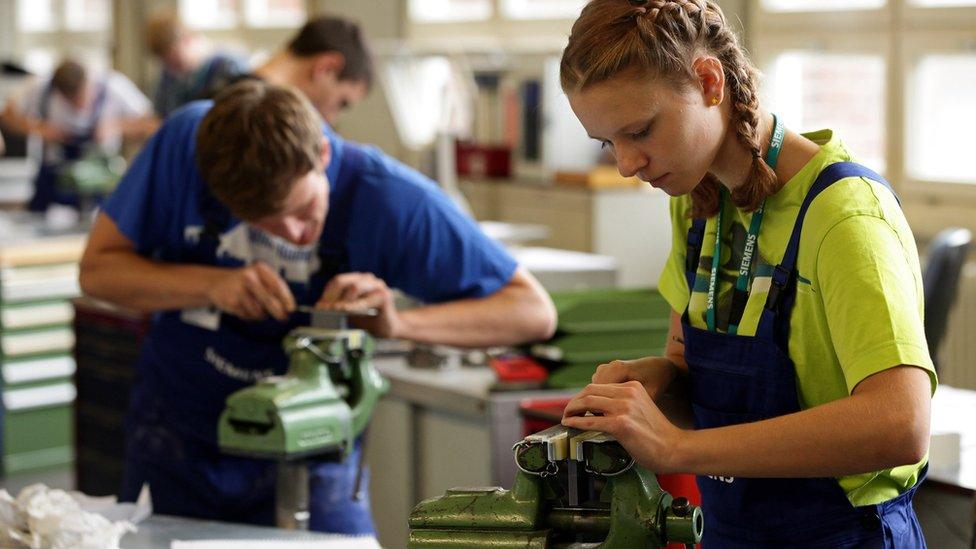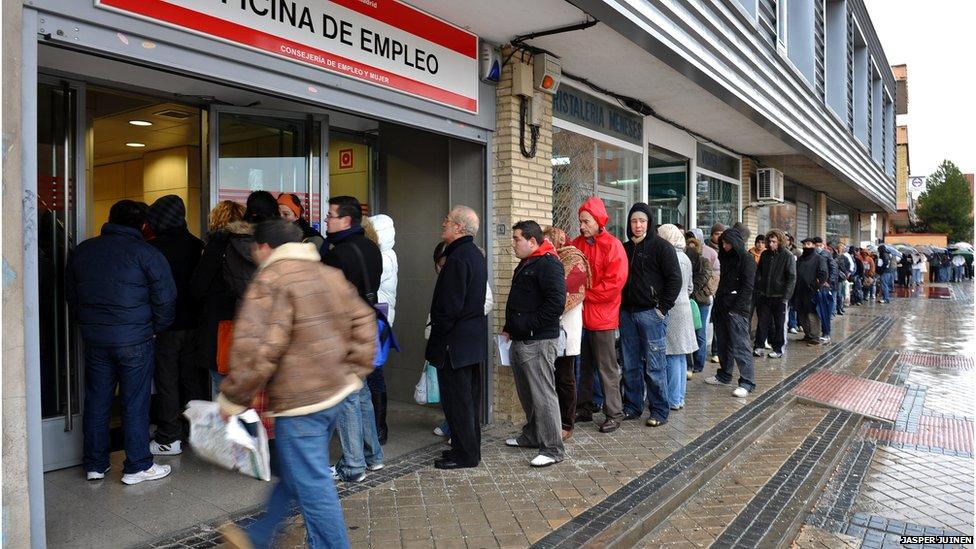Ciao Italia! Germany's other migrant influx
- Published

Pasta is increasingly on the menu in some parts of Berlin
More than a million refugees and migrants from war-torn regions of the Middle East and Africa came to Germany in 2015. It was the news story of the year. But at the same time Germany has been quietly undergoing a radical transformation with another influx of people from closer to home.
In my neighbourhood of former communist east Berlin there's an Italian deli with the best ciabattas in town. Glamorous young Italian waiters from the Italian restaurant opposite run across the road for occasional emergency supplies of pecorino or parmesan, shouting extravagantly "buongiorno" to their German neighbours.
On the same street, there's also a stylish Catalan restaurant, round the corner at least three other Italian eateries and on the next block a Spanish restaurant which holds regular Flamenco workshops.
Welcome to the new Germany. Until a few years ago our local cafes were more about wurst and sauerkraut than pizza and pasta.
German stability
But in 2009 the eurozone debt crisis hit, bringing Southern European economies to their knees and pushing a new generation of young Greeks, Italians and Spaniards to the richer North to find work - changing the face, and the food, of Germany.
There are more foreigners living in Germany today than at any time in the country's history. One in 10, or some 8.2 million people in Germany, are non-German. Many of them are young, educated graduates from crisis-rocked Southern Europe.
Of these, some 400,000 from Greece, Spain, Portugal and Italy are employed taxpayers in Germany. Many more are freelancers, students or self-employed workers.
"There was no work available in Italy, the country was doing really badly economically and there was an uncertain political climate. It was a chaotic moment," explained Luigi Serenelli, a 33-year-old Italian with two masters degrees, who moved to Berlin in 2012 with aspirations to become a journalist.
"Germany represented stability and an opportunity to find work and really do something with your life," he says.


In Spain and Greece youth unemployment hovers at around 50%. In Italy it is around 40%. In Germany it's only 7%.
The influx is welcome however as many German employers can't fill job vacancies, particularly doctors, qualified care staff and specialised engineers.
Which is where savvy young Southern Europeans come in. Faced with no prospects at home the clever workers with get-up-and-go have just got up and gone and headed to Germany.
They're often prepared to do the demanding jobs that many German workers don't want — particularly in the care sector, where pay is low by German standards, but still much higher than in Southern Europe.
A country of immigration
In fact migration sparked by the eurozone crisis has changed Germany irrevocably, believes Professor Dr. Alexander Kritikos, an economist at the influential Berlin research institute DIW, who grew up in Germany but whose father is Greek.
"Over the last four or five years Germany has changed enormously. We suddenly became a 'country of immigration' without even noticing," he says.
This is radical because the last time Southern Europeans migrated to Germany en masse, they weren't even supposed to stay, let alone change the country.
In December, Germany quietly marked an anniversary. In 1955 Germany signed its first so-called guest worker contract, not with Turkey, as is often believed, but with Italy. Other similar contracts were signed with Greece, Spain and Portugal.
The aim was to bring in manual workers to help support Germany's booming economy.
They were called "guests" as it was assumed they would go back one day. But many decided to stay, and became part of the country, whether Germany wanted them to or not. That was when Germany's first generation of Italian restaurants arrived.
This time round, instead of agricultural labourers and factory workers, it's Southern European doctors, engineers and software designers who have come. As EU citizens they enjoy the same rights as Germans.

Germany offers apprentices one of the highest quality programmes of training
So specialist engineers have headed to the wealth-generating manufacturing firms of Baden-Wuerttemberg and science graduates to Bavaria's biotech or pharmaceutical sector.
"It's a win-win situation for Germany," says Professor Dr. Daniel Goeler, migration expert at the University of Bamberg.
"(Germany) gets more out of it than the migrants themselves probably. They come under their own steam, specifically to the parts of Germany that need them.
"They might arrive on a Saturday with a job contract in their pocket, ready to start work on a Monday. They don't need support from the state, they pay their taxes and find their own accommodation. For the German state it's like a gift from heaven."
So they are better accepted by German society than the "guest workers" of the 20th century. And with similar European cultural attitudes they are often seen as easier to integrate than migrants from Africa or the Middle East.
The large luxury hotel chain Steigenberger has recently taken on 13 young Spanish trainees who are learning German and will do the same strict three-year hotel apprenticeship as Germans.

High unemployment has driven many Spaniards to seek work elsewhere in the EU
They learn all aspects of the hotel trade and have a take-home pay of 818 euros (£621) a month. If all goes well at the end of their training they will be offered a full-time permanent position.
Roberto Rojas, a spokesman for the hotel chain, says that the chance to employ workers from other European countries is a bonus.
"Having staff with other languages and from other cultures is a real advantage for our guests who come from all over the world. The hotel industry thrives on diversity," he said.
"Our Spanish trainees have a completely different level of motivation. They've left their families behind and are learning a new language. And with youth unemployment at 50 % in Spain, they are really grateful to have this chance. We see that in the way they are prepared to go the extra mile in their work."
"It's given us all the chance to succeed," says Luigi, who has learnt German and is now working as a journalist.
The next chapter
One of his Italian friends has found a job as an engineer in Bremen. Another set up a website in Germany which then gave him enough experience to find work back in Italy.
And that could become the next chapter of the story.
Unlike previous generations of workers from Southern Europe, these latest arrivals are well-educated, mobile and living in a globalised world which makes it easier to move on to the next opportunity.
They've helped Germany. And in many cases Germany has helped them. But now that growth is slowly returning to Italy and Spain, some are wondering whether it's time to return home.
- Published12 January 2016

- Published11 January 2016

- Published9 January 2016

- Published7 January 2016
- Published4 January 2016

- Published2 January 2016
